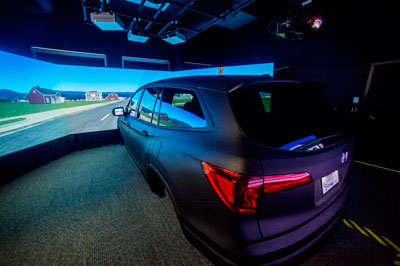Need more information? Contact us
During Distracted Driving Awareness Month, UAB has opened the first SUV driving simulator laboratory in the world.
In the development of this lab, UAB partnered with Honda Manufacturing of Alabama, which provided a full-bodied 2016 Honda Pilot built at their factory in Lincoln, Ala., to be retrofitted with state-of-the-art simulator technology funded by the Alabama Department of Transportation. The technology gives UAB researchers the opportunity to conduct important safety studies involving distracted driving practices.
Representatives from Honda, ALDOT and Alabama’s Office of the Attorney General joined the UAB team to announce the new initiative at a grand opening this week.
“Honda Manufacturing of Alabama is honored to partner with UAB in this important project, with the goal of saving lives by increasing awareness of distracted driving,” said HMA Vice President Mike Oatridge. “Honda is very pleased we could donate the most advanced Honda Pilot ever built in Alabama, which has a five-star crash safety rating and features Honda most advanced safety features including the full range of Honda Sensing technology.”
The goal of this effort is to facilitate solutions and best practices in motor-vehicle-related safety and crash prevention, addressing the major public health problem of highway and traffic-related injuries and death.
“Data tell us that distracted driving is a factor in nearly 50 percent of car crashes, which translates to one million injury-producing crashes each year,” said Despina Stavrinos, Ph.D., an assistant professor in the Department of Psychology in UAB’s College of Arts and Sciences and director of the UAB Translational Research for Injury Prevention Laboratory. “Ten percent of those crashes result in a fatality. Understanding which factors influence an individual’s likelihood to engage in distracted driving is essential to being able to purposefully address this growing problem. With this new simulator, we will be able to gain new information about how drivers participate in distracted behavior, giving us valuable insight that can increase the effectiveness of educational campaigns and improve driving safety.”
 The core of Stavrinos’ work is the prevention of injury, particularly unintentional injuries like those that result from distracted driving behaviors. She will lead her TRIP Lab in conducting studies with the new simulator.
The core of Stavrinos’ work is the prevention of injury, particularly unintentional injuries like those that result from distracted driving behaviors. She will lead her TRIP Lab in conducting studies with the new simulator.
The first study, set to begin in a couple of weeks, will focus on teens and adults over 65, two of the most vulnerable populations when it comes to distracted driving.
The simulator is intended to be available to researchers from all appropriate disciplines throughout UAB, other universities in the state, and even throughout the Southeast. In addition, non-university research scientists will be afforded access to the simulator and its associated support services.
“UAB really thrives on investing in resources that are going to allow multidisciplinary research to take place,” said Richard Marchase, Ph.D., vice president for research and economic development at UAB. “With this new technology, which we are very thankful to Honda Manufacturing of Alabama and ALDOT for helping us create, we will be able to do just that and make this facility a destination for collaboration and innovation for researchers across campus and beyond. It will be a resource that I’m sure will be game-changing.”
“Honda Manufacturing of Alabama is honored to partner with UAB in this important project, with the goal of saving lives by increasing awareness of distracted driving,” said HMA Vice President Mike Oatridge. “Honda is very pleased we could donate the most advanced Honda Pilot ever built in Alabama, which has a five-star crash safety rating and features Honda's most advanced safety features, including the full range of Honda Sensing technology.”
Individuals interested in utilizing these resources or contributing should contact Stavrinos at dstavrin@uab.edu or (205) 934-7861.